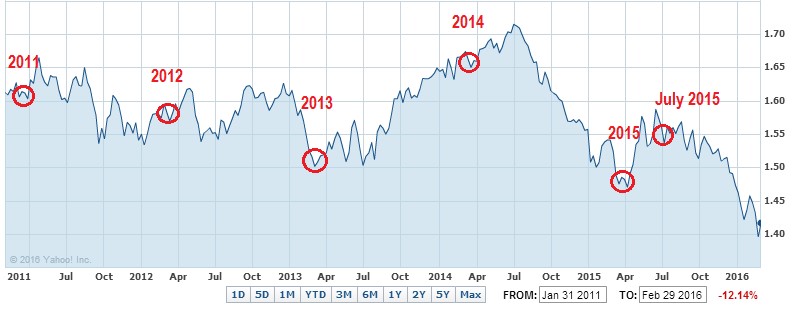U.K. Budget 2016 and the Impact on Sterling: What to Expect
With the 2016 U.K. Budget descending upon us, market participants are anticipating another wave of austerity from the Conservative majority. While there’s plenty of speculation about pensions, tax relief and petrol duties,[1] U.K. Chancellor George Osborne has made it clear that the government will seek further spending cuts to safeguard against a volatile global economy.
“We may need to undertake further reductions in spending because this country can only afford what it can afford and we will address that in the Budget, because I’m absolutely clear we’ve got to root our county in the principle that we must live within our means and we have economic security,” Mr. Osborne said during a trip to Shanghai in late February.[2]
For traders, the budget announcement is a time of great anxiety. The need to balance technical indicators with market fundamentals and political reactions make trading the pound especially challenging during this period. That’s why sterling often trends downward in the weeks leading up to the Budget announcement. As the image above (Source: Yahoo! Finance) illustrates, the GBP/USD exchange rate begins or continues its descent in the weeks leading up to the Budget. This is usually accompanied by a large rebound in the days and weeks following the announcement.
U.K. Budget Dates
- 2016 Budget: March 16
- 2015 Budget: March 18
- 2015 Summer Budget: July 8
- 2014 Budget: March 19
- 2013 Budget: March 20
- 2012 Budget: March 21
- 2011 Budget: March 20
Price action leading up to the 2016 Budget on March 16 indicates a similar downtrend. However, it should be noted that the pound’s freefall in early 2016 reflects ongoing fears about Brexit. According to analysts, the pound could be in for a 20% drop should Britons vote to quit the European Union in June.[3] Against this backdrop, the pound is expected to remain under pressure in the coming weeks leading up to the Bank of England’s policy meeting on March 17. Given the lack of high profile U.K. or U.S. data over the next two weeks, political reactions to the Budget statement and BOE will dictate the performance of the GBP/USD.
How to Prepare
Like any other fundamental event, the U.K. Budget statement is considered both a risk and an opportunity. Volatile news events like a budget statement allow for great speculative opportunities, especially through the options market, which is generally more cost efficient than other markets. Options allow traders to profit from both rising and falling market conditions via calls or puts, respectively. They also allow traders to specify their risks upfront so they’re not exposed to bigger losses in the event the market goes against them. Some brokers like easyMarkets provide guaranteed stop losses during day trades and negative balance protection that ensure traders don’t enter into debt on a bad position. These tools are essential for trading effectively during highly volatile events like budget statements.
Risk warning: Forward Rate Agreements, Options and CFDs (OTC Trading) are leveraged products that carry a substantial risk of loss up to your invested capital and may not be suitable for everyone. Please ensure that you understand fully the risks involved and do not invest money you cannot afford to lose. Our group of companies through its subsidiaries is licensed by the Cyprus Securities & Exchange Commission (Easy Forex Trading Ltd- CySEC, License Number 079/07), which has been passported in the European Union through the MiFID Directive and in Australia by ASIC (Easy Markets Pty Ltd -AFS license No. 246566).
[1] Alice Foster (March 4, 2016). “When is the budget? Predictions, what to expect.” Express UK.
[2] Kate McCann (February 26, 2016). “George Osborne warns of deeper cuts to public spending in Budget.” The Telegraph.
[3] Daniel Johnson (March 1, 2016). “The Pound Strengthens, but How Long will the Rally Last?” Pound Sterling Forecast.

